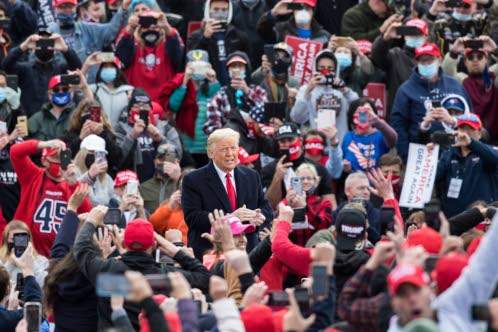WASHINGTON, DC, United States (AFP) — Donald Trump’s re-election campaign was buffeted yesterday by another COVID-19 outbreak in his team, surging infections across the United States, and an uncomfortable admission by his chief of staff.
Nine days before the vote — and with total US coronavirus deaths nearing the grim total of 225,000 — Trump’s Chief of staff Mark Meadows conceded that “we are not going to control the pandemic”.
Instead, he said, “We are going to control the fact that we get vaccines, therapeutics and other mitigation areas.”
But Democrat challenger Joe Biden’s campaign immediately seized on Meadows’ comments to hammer the Administration over the virus, which has set records for new cases in recent days.
“They are admitting defeat,” Biden’s running mate Kamala Harris said during a campaign stop in Michigan, “and I’ve been saying that, and Joe Biden has been saying that since the beginning.”
Vice-President Mike Pence’s chief of staff Marc Short, as well as a number of other aides, tested positive for the virus over the weekend, swelling the list of the Administration staff to have caught the virus.
The vice-president is going to continue his travel schedule,” Trump campaign spokesman Tim Murtaugh told Fox News.
“The folks on his staff are in quarantine, and he relies on the very sound medical advice of the White House medical unit.”
Trump officials sought to brush aside the crush of bad COVID news by attacking Biden’s energy levels and what it says is his paltry list of accomplishments in his 47 years in Washington.
Murtaugh slammed Biden for his light campaign schedule, saying the Democratic challenger was “feeling the heat” and “took five out of six days off” before the last presidential debate on Thursday.
The remarks drew a contrast to the furious pace that Trump, 74, has maintained for days — including planned stops yesterday in New Hampshire and Maine — while Biden has set a more cautious course, speaking less frequently and to smaller, socially distanced groups.
Biden, 77, planned yesterday only to take part in a virtual ‘I will vote’ concert, his campaign said.
But his deputy campaign manager vigorously defended him, telling NBC’s Meet the Press that “we are campaigning incredibly hard”.
“The difference between what we’re doing and what Donald Trump is doing,” said Kate Bedingfield, is that “we’re doing it safely.”
Ahead of the November 3 election — and with more than 57 million Americans having cast early votes — both campaigns are scrambling to make their closing arguments and win over the few still undecided voters.
On Saturday, an energised Biden and former president Barack Obama accused Trump of massively mishandling the pandemic.
“Donald Trump isn’t suddenly going to protect all of us. He can’t even take the basic steps to protect himself,” Obama said, referring to Trump’s hospitalisation for COVID-19 three weeks ago.
But the president has remained ebullient and constantly sought to project confidence despite trailing in national polls.
Trump, who has sought to shift voters’ attention to his plans for the economy, told supporters in North Carolina, “This election is a choice between a Trump super-recovery and a Biden depression.”
Trump plowed through three campaign rallies in one day on Saturday as he sought to close the gap with Biden by playing down the coronavirus crisis and complaining that the media was fixated on the problem.
Biden’s response: Trump himself should be more fixated on the problem.
“That’s Donald Trump’s presidency,” Biden said during a drive-in rally Saturday in his native Pennsylvania, a critical swing state.
“Donald Trump said, and is still saying, ‘we’re rounding the corner. It’s going away. We’re learning how to live with it.’”
Biden said: “We’re not learning how to live with it. You’re asking us to learn how to die with it.”
The US registered a record number of daily infections for a second day running on Saturday with nearly 89,000 new cases.
Biden has maintained a stable lead of around 10 points in national polls, and narrower leads in battleground states like Florida that typically decide the winner of US presidential elections.
But both Republicans and Democrats are wary of polling after the stunning upset Trump pulled off in 2016 when he defeated Hillary Clinton.










